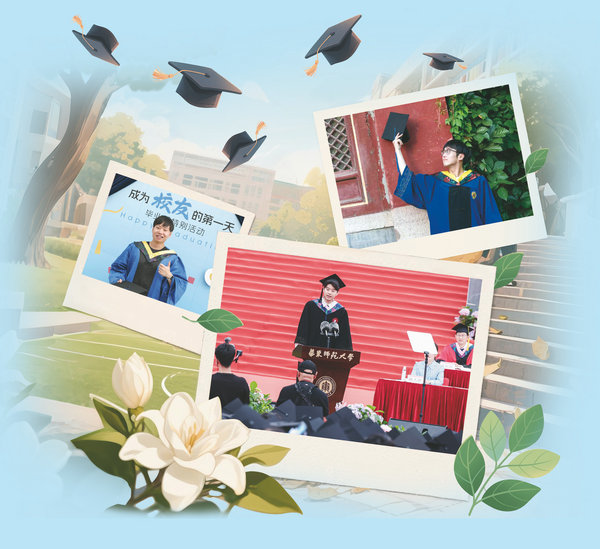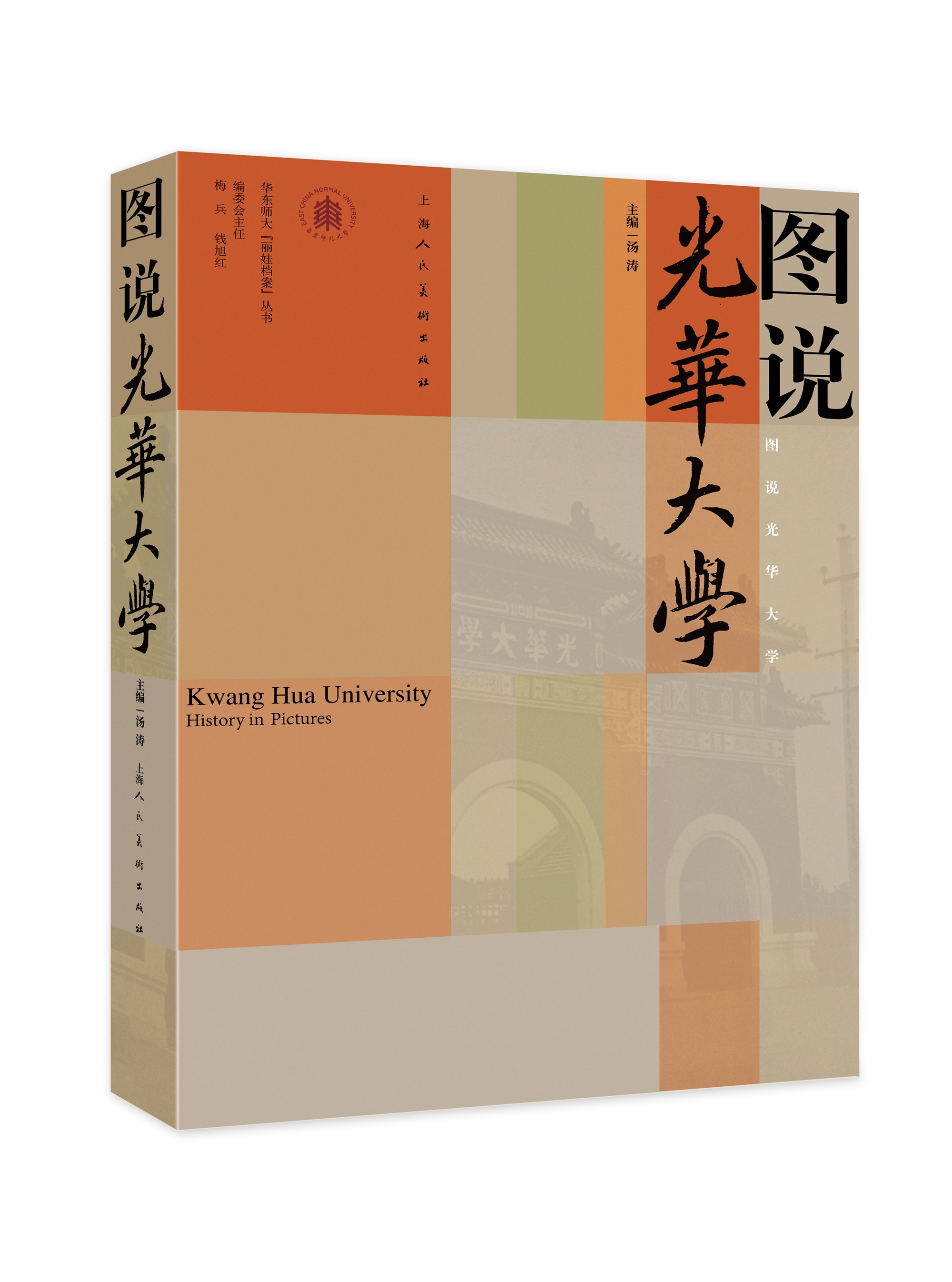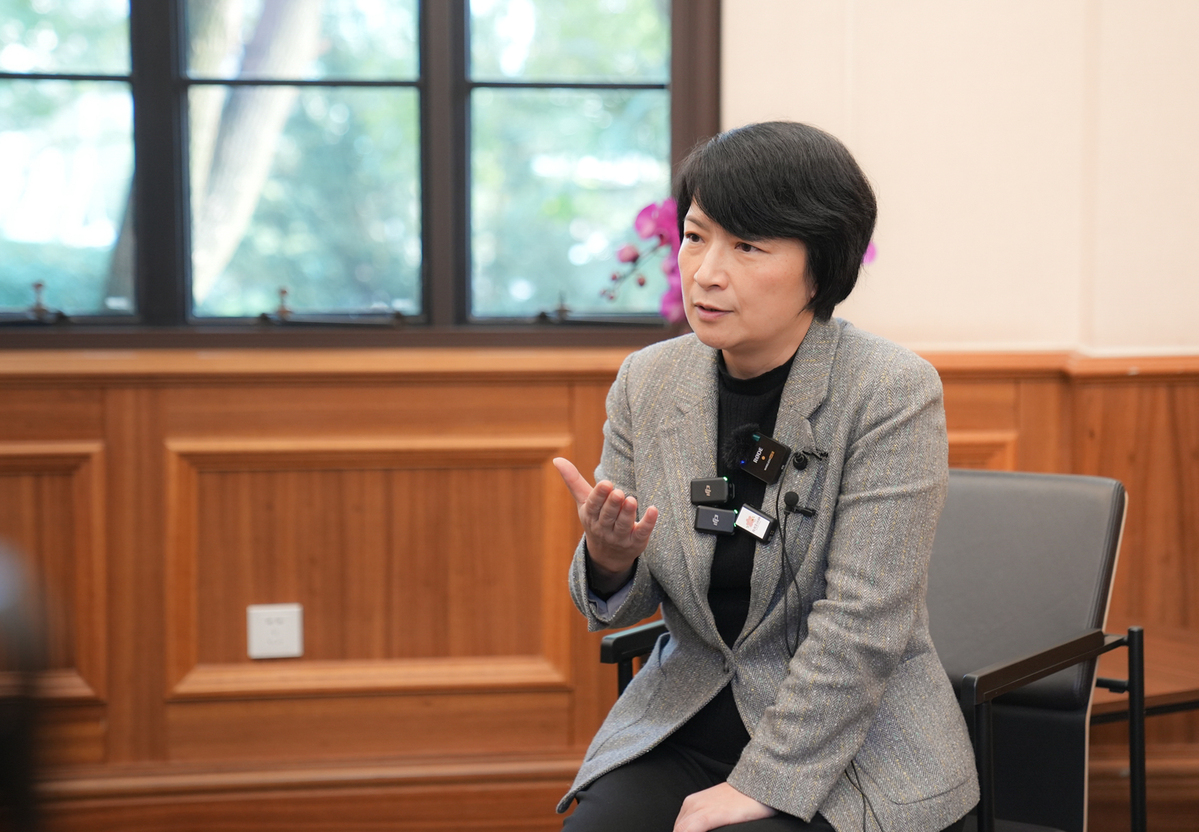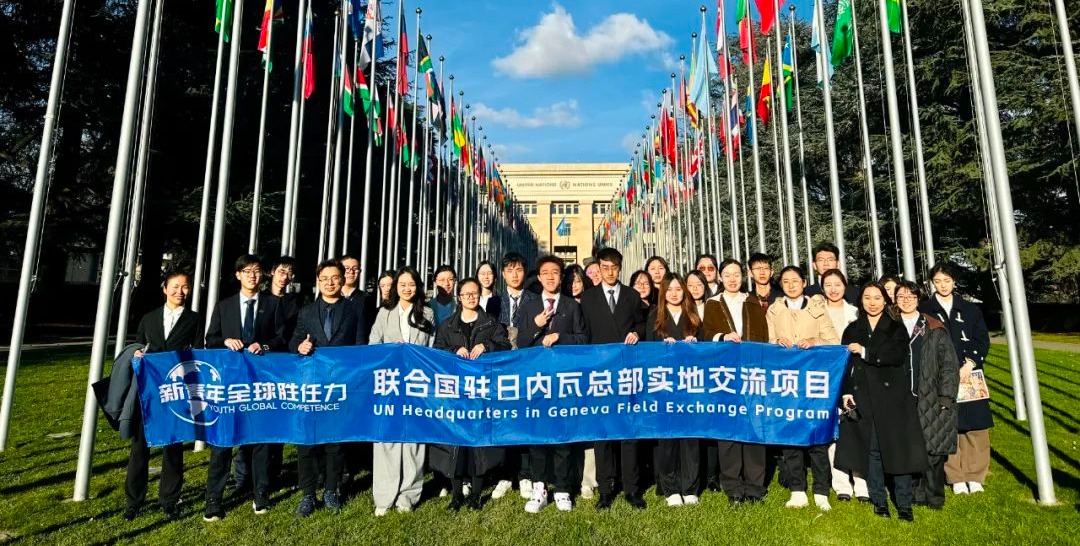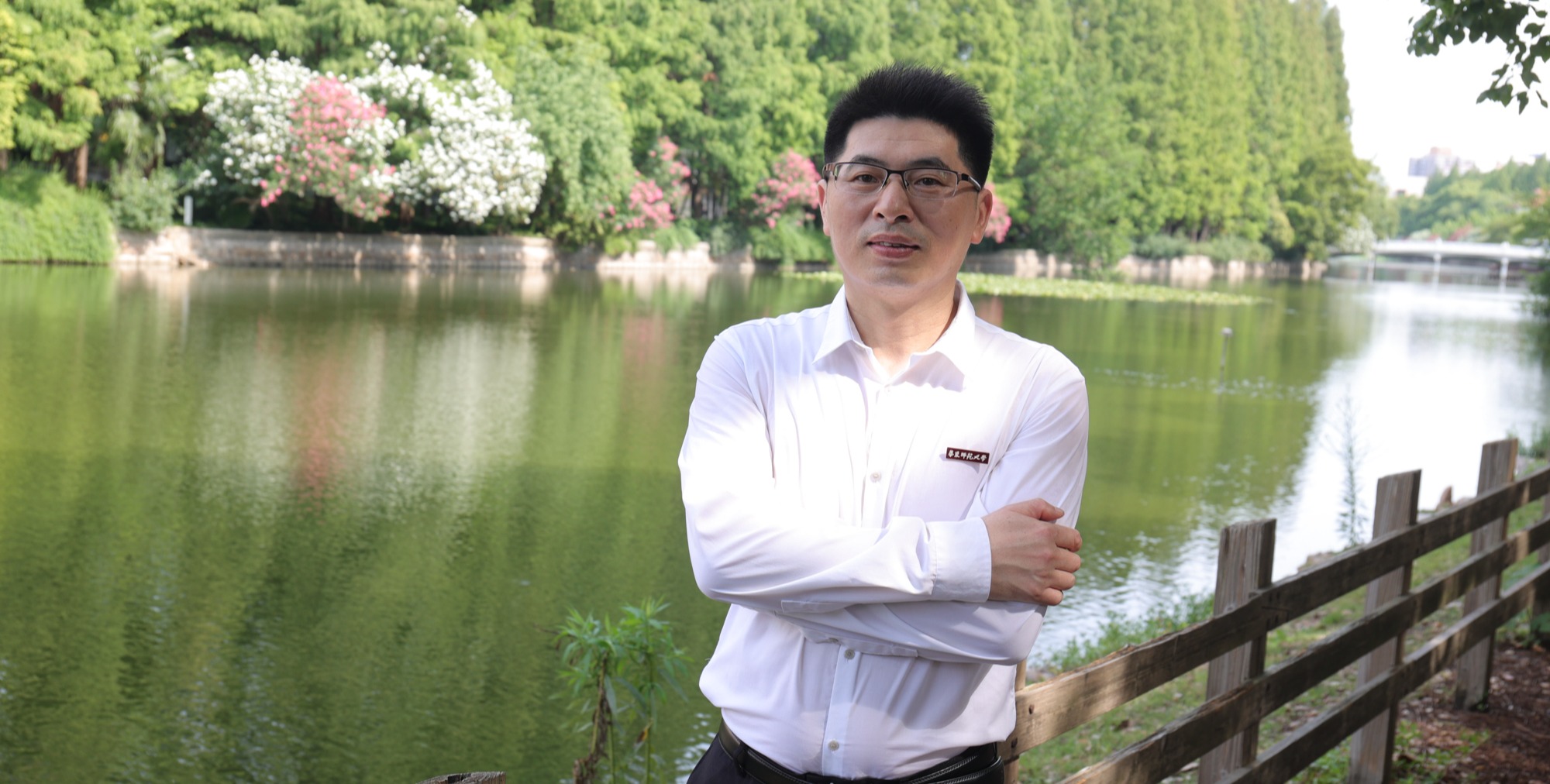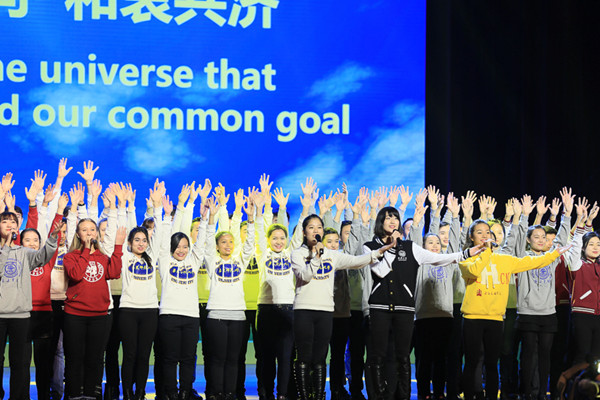
The Opening ceremony starts with a chorus by Chinese and overseas students from Shanghai universities.
The 10th Annual Confucius Institute Conference was held in Shanghai on December 6-7, 2015. More than 2,300 university presidents and Confucius Institute directors attended the conference this year.
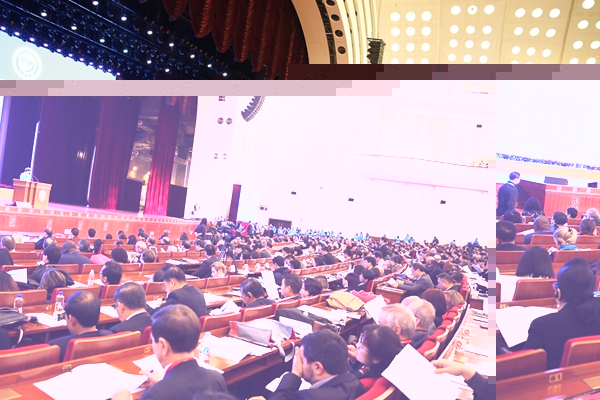
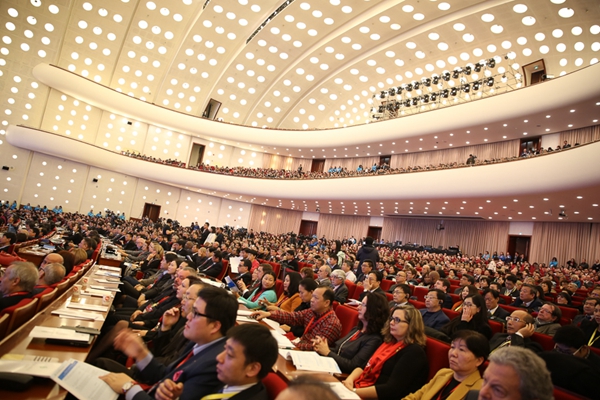
More than 2,300 university presidents and Confucius Institutes directors attend the conference.
Liu Yandong, a member of the Political Bureau of the Central Committee of the CPC, who also serves as Chinese Vice Premier and Chair of the Council of the Confucius Institute headquarters, attended the conference and gave a keynote speech. The tide of current global cultural exchanges and the trends of China’s development has brought unprecedented opportunities and bright prospects to many Confucius Institutes, said Liu. She pointed out that to achieve a higher level, Confucius Institutes should focus on “specialty, quality, innovation, cooperation, and brand.”
Liu said that quality was always the lifeline of the Confucius Institutes. She said that the Confucius Institute project had grown from the stage of expanding scales to the stage of improving quality. Confucius Institutes should try to improve the quality of both Chinese and foreign directors, improve the abilities of teachers, the use of multimedia means to increase the charm of Chinese language teaching, improve the academic research abilities, implement “neo-sinology” plan, cultivate a new-generation sinologist and endeavor to build a discourse system that integrates Chinese and foreign cultures together.
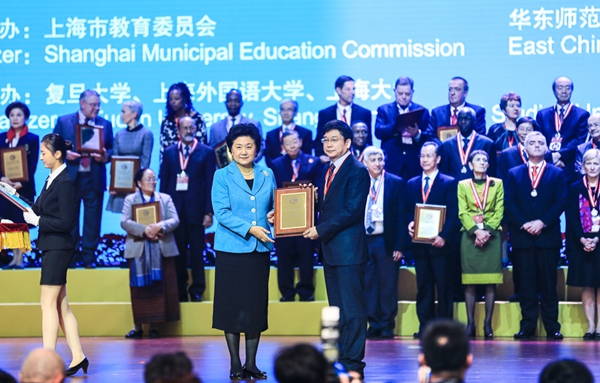
ECNU wins the prize for outstanding cooperation Chinese organization again this year.
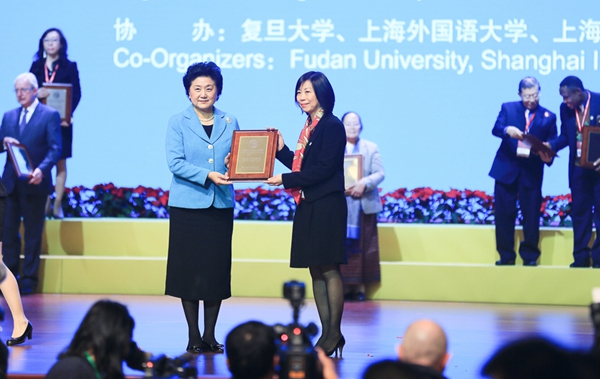
The Confucius Institute at the University of Basel is awarded as an exemplary Confucius Institue. The Institute is an cooperation between the University of Basel and ECNU.
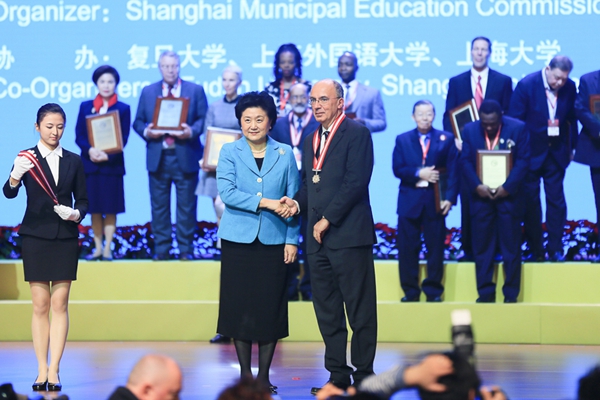
Gianmaria Ajani, President of University of Torino, is awarded as an outstanding individual for the development of the Confucius Institutes in Italy. The Confucius Institue at the University of Torino was estabilshed in 2008 and ECNU is its Chinese partner.
Confucius Institutes serve as important platforms to help the world know China’s language and culture. They have played an active role in facilitating people from around the world to learn the Chinese language and understand its culture better. In addition, they have also made important contributions to China’s people-to-people exchanges from around the world, as well as the development of a diverse and colorful world civilization.
Up to now, a total of 500 Confucius Institutes and 1,000 Confucius Classrooms have been established in 134 countries and regions across five continents, with 1.9 million registered students. The number of part-time teachers reached 44,000, and the number of students registered for online courses reached 8 million.
The opening ceremony started with a chorus by Chinese and overseas students from Shanghai universities. Shanghai Mayor Yang Xiong also gave a welcome speech. Roseann O’Reilly Runte, President of Carleton University in Canada, Kong Maoting, staff member of the Confucius Institute of Western Kentucky University, and ECNU President Chen Qun gave speeches.
Chen Qun said that ECNU was honored to be one of the first Chinese universities to take part in the Confucius Institute project. In 2008, “International Chinese language Teacher Training Base at ECNU” was set up, which was the first Confucius Institute in China. Chen Qun said that Base trained more than 6,500 Chinese language teachers for the Confucius Institute. ECNU also launched “Seed Project” in cooperation with countries along with “One Belt and One Road.” “Seed Project” trains language and other professionals in short demand for these countries. At the beginning of this year, directed by the Confucius Institute Headquarters, ECNU established the International College of Chinese Language Teachers, which provides strong support for training teachers.
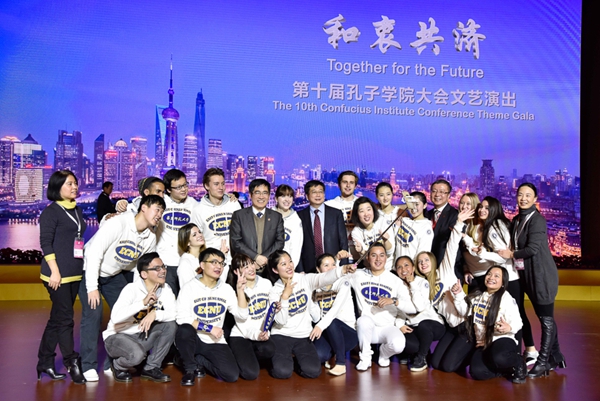
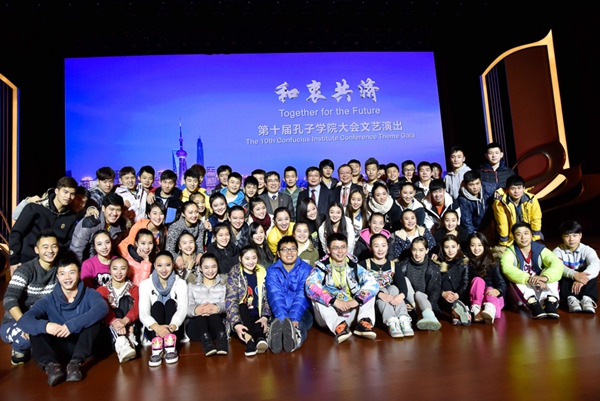
ECNU leaders Tong Shijun, Chen Qun and Ren Youqun take a group photo with the volunteers for the conference.
During the conference, 18 Presidents’ Forums and Directors’ Forums and the Confucius Institute Chinese Language Teaching Resource Exhibition were held. The discussed topics including international Chinese language tests, local Chinese language teacher training, and the resource sharing of the Confucius institutes. Participants also shared their experiences in the implementation of the neo-sinology plan. The presidents’ forum discussed the presidents’ support for the Confucius Institutes, the development plan of the Confucius Institutes for the years 2016-2020, and the Confucius Institutes VS “One Belt and One Road.”
After the keynote speech, Liu Yandong presented awards to outstanding Confucius Institutes, classrooms, staff, cooperation organizations and exemplary Confucius Institutes.
More about the conference:
Liu Yandong attends and addresses the opening of the 10th Confucius Institute Conference
SHANGHAI, December 6 (Xinhuanet)--Reporters learned from the 10th Confucius Institute Conference opened in Shanghai on Dec. 6 that up to the present China has established 500 Confucius Institutes and 1,000 Confucius Classrooms in 134 countries and regions around the world with the total number of students reaching 1.9 million. The future building and development of Confucius Institutes will highlight localization and focus on quality improvement and intensive development.
With the theme “Cater to New Demand and Push for Integration”, the conference is co-hosted by Confucius Institute Headquarters (Hanban) and Shanghai Municipal People’s Government and organized by the Shanghai Municipal Education Commission and East China Normal University. A total of 2,300 participants attended the conference including university presidents and representatives of Confucius Institutes from more than 130 countries and regions.
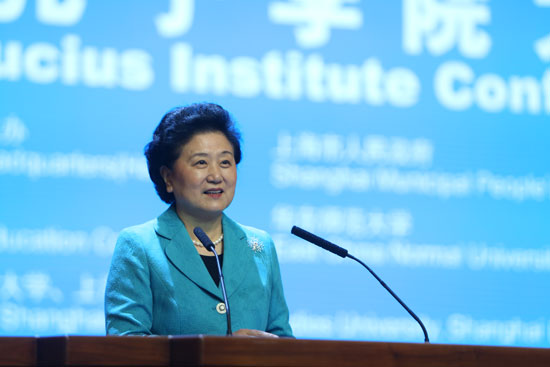
Vice Premier Liu Yandong addresses the opening of the 10th Confucius Institute Conference.
Benefiting from the UK, France, Germany and Spain’s experience in promoting their national languages, China began its own exploration through establishing non-profit institutions named “Confucius Institute” in 2004, aiming to promote Chinese language and culture in foreign countries.
Over the years, Confucius Institutes, through the power of language transmission, have set up a “bridge of understanding” between people of China and other countries. In the meantime, Confucius Institutes have been running at an increasingly higher level, and the operating mode has been getting more comprehensive. At present, there are about 44,000 full-time and part-time teachers from China and foreign countries. Staff in different countries have compiled more than 1,200 textbooks to meet the local needs. As many as six million people all over the world have participated in Chinese language proficiency tests. In recent years, those Confucius Institutes which have been running for more than three years have conducted operating and financial audits; more than 280 Confucius Institutes have submitted special reports in the name of the presidents. A good image of Confucius Institutes as being open and transparent has thus been displayed to the world.
Meanwhile, Confucius Institutes have made significant contributions to the promotion of people-to-people exchange between China and the rest of the world. Solely in the most recent year, as many as 36,000 cultural exchange activities took place, involving the participation of 12 million people. Apart from sending more than 40 art groups on performing tours to 260 Confucius Institutes, the Headquarters also invited more than 30,000 education officials, university presidents, teachers and students from other countries to China, which has added positive energy to the mutual understanding and win-win cooperation between China and different countries.
It was revealed from the Conference that facing the new decade, Confucius Institutes will root in local communities, reform the teaching contents and methods, and train local teachers to actively adapt to the diverse and individualized needs of learners in different countries. As far as academic research is concerned, Confucius Institutes will implement the “Confucius China Studies Program” in an endeavor to produce a new generation of Sinologists and explore the establishment of a Sino-foreign communication system through language. Transparent operations enhance mutual trust and remove misgivings. Confucius Institutes will make efforts to continue enhancing their teaching and ensure a sustained and healthy development.
News source: Hanban News

